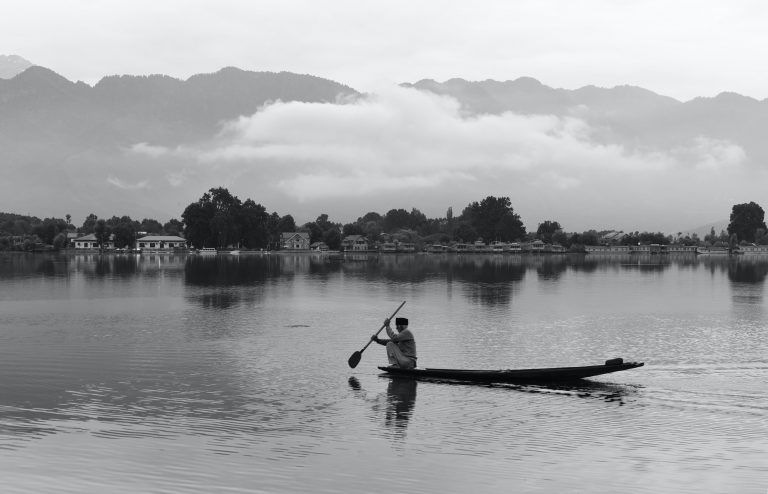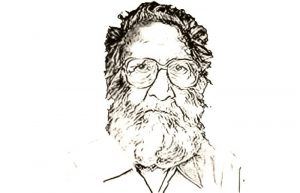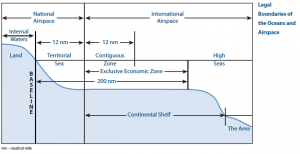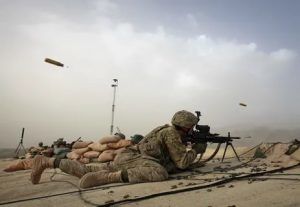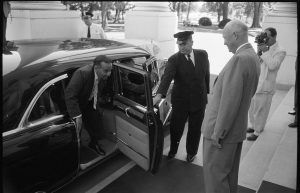“Glistening under the twilight rays
The bend of the Jhelum gets dim
In the dark, looking like a dagger in its sheath;
Following the ebb tide of the day
The nocturnal high tide appears
With star-flowers floating on its sombre waters.
Below the obscure mountain plateau
A range of Deodar trees :
As though the entire Creation has grown eloquent in its dream,
Unable to articulate,
It whimpers in the dark, emitting masses of ineffable sounds.”
– Rabindranath Tagore, (Balaka, “Flight of Swans”, No. 36, 1914); -Translated by: Prithwindra Mukherjee
Kashmir was known as the ‘paradise on earth’ because of its enormous natural beauty. Rabindranath was so attracted by Kashmir; he once visited Srinagar in his life, the capital of Kashmir. There he wrote some poems included later in his book Balaka. I am sure he did not imagine even that soon Kashmir would turn into a warfare. And thousands of armies would be patrolling there every day.
During the reign of Shikh Ranjit Singh (1780–1839) Kashmir was a huge empire whose capital was Lahore. Ranjit Singh took control of Kashmir from the Mughals in 1819. In his time Ranjit Singh oppressed the Muslims of Kashmir and the Shikhs were Islamophobic too. Though the Shikhs believe in monotheism and also opposed the religious idolatry. Ranjit Singh was an orthodox Shikh and one of his trusted commanders was Gulab Singh. He was Dogra Hindu. Ranjit Singh entrusted Gulab Singh with the ruling of Jammu. Gulab Singh was a Dogra Punjabi Hindu. Punjabi language has three different dialects.
One is Lahanda which is also called Hindki. Hindki is used in the west of Punjab. It is the informal language of Punjabi Muslims. The Shikhs use another dialect which is recognized as formal Punjabi language. And the Dogri is another dialect of Punjabi tongue which is generally used by Punjabi Hindus. Now the Hindus of Jammu use Dogri as we see. The East-India company occupied Kashmir in 1846. But Gulab Singh bought Kashmir from the company that time with 10 lac starling pounds. And he became the King of Jammu-Kashmir.
The north part of Jhelum River is called the actual Kashmir valley. This valley is 85 miles long and 20 to 25 miles wide. Kashmir was a Muslim Sultanate, established by Shah Mirza or Mir in 1346. He was a seeker of destiny. Shah Mirza came to Kashmir from Swat. Soon he became a trusted high ranked official of the Hindu King. He became the Ruler of Kashmir after the King died. He also got married to the widowed queen. There were some more Muslim Sultans of Kashmir. Shah Sultan Mirja (1346), the statues destroyer Sultan Sikandar (1393–1416), Sultan Jaynul Abedin (1420–1467), Mirza Haider (1541–1551).
But Kashmir became a part of the Mughal Empire when Emperor Akbar seized Kashmir from the Sultans in 1586. There was a time when Kashmir was an individual Muslim Sultanate like Bangladesh of today. Kashmir had its distinct national characteristics that time. Muslims of Kashmir used to talk in Kashmiri Language. But now their cultural language is Urdu. But it is Kashmiri Urdu; which is different from mainstream Urdu because of the influence of Kashmir’s own linguistic variation there. After Gulab Singh, Hari Singh became his successor and joined Indian Union in December of 1947. And the Indo-Pak war began in Kashmir.
British Indian Empire was divided into two parts during British reign in this subcontinent. One part was ruled directly by the British. It was called British-India. The other part was left to be ruled by the local rulers. About twenty percent of India was ruled by Local rulers. Among them, Kashmir was a state which was ruled by local ruler. But a question aroused that time about what would happen to the local rulers when India would be freed from British Colony. So they came upon a decision that the local rulers will have the freedom of choice to become a part of India or Pakistan if they want or they can be an independent state too. The ruler of Junagadh was Muslim, but most of the people of this state were Hindu. As the ruler was Muslim so he decided to join Pakistan after independence. But India took possession of Junagadh because it was a Hindu majority state and also it was situated so far away from Pakistan. At the same way Kashmir was a Muslim majority state but its ruler Hari Singh joined India even though Kashmir was Muslim majority and also adjacent to Pakistan. As a result Pakistan attacked Kashmir and it initiated the Indo-Pakistan war over Kashmir.
To end the war, the prime minister of India, Pandit Jawaharlal Nehru took the matter to United Nations. United Nations Security Council suggested a cease-fire and also asked to take plebiscite in Kashmir. Upon agreeing with UN, both India and Pakistan stalled the war. Though Pakistan wanted plebiscite in Kashmir but India disagreed. In 1957 United Nations Security Council again asked to take plebiscite in Kashmir but Soviet Union vetoed the idea of plebiscite. So there remained no chance of plebiscite in Kashmir. That time, Pakistan already had the one-third of former Kashmir. Which is now called Azad-Kashmir. Azad-Kashmir is not absolutely a part of Pakistan. Again it’s not India’s Kashmir too.
As Pakistan still want the plebiscite. That’s why they are not calling Azad-Kashmir as a part of Pakistan. During British reign, the Ruler of Kashmir took possession of Ladakh. The people of Ladakh look exactly like the Tibetan. They talk in Tibatan language. And the people follow nor Hinduism, nor Islam. They follow Tibetan Lama Buddhism. In September of 1962, China grabbed 12 thousand square mile of Ladakh, saying this is a part of Tibet. So during the rule of Kashmiri ruler which was called the state of Jammu-Kashmir is now divided in three parts. One part is controlled by Pakistan, one by India and the other part is controlled by China. So the situation of Kashmir has now become more complex then it was before. Now China is also a part of Kashmir crisis. Moreover China has established a naval base in Gwadar.
So if India and Pakistan initiate war on Kashmir, China might also get involved. Indus waters treaty was signed in Karachi between India and Pakistan with the mediation of World Bank. It gave Pakistan the right to utilize water from Jhelum River. In Mirpur of Azad-Kashmir, Pakistan has built Mangla Dam on Jhelum River to obtain full use of the water. But now India is not agreeing with the treaty. They want to restrict the water flow from Jhelum. If India violates the treaty, then this will certainly provoke a war. As India and Pakistan both have nuclear weapons, a war might leave devastating consequences.
Not only on Kashmir also in South India, disputes are arousing between Karnataka and Tamil Nadu for the water of Kaveri River. These two states are not eager to obey the verdict of Supreme Court about sharing water equity. To meet the water inflow of Kaveri, India decided to excavate a canal to flow water from Ganges to Kaveri. And to meet the deficiency of Ganges, one more canal will be excavated from Assam’s Brahmaputra to Ganges. Bangladesh is already lacking water because of Farakka Barrage. And if India had acted on this plan, Bangladesh might have been deprived from water of Brahmaputra. But India won’t be acting on this plan because China has built a dam on the River Tsangpo to utilize its water.
Because of this dam the flow of Brahmaputra already has been ceased from Tibbet. So the problem is not only with Jhelum River. The river named Sindhu has originated from Manas Lake in Tibet; so has Tsangpo. Tsangpo is called Brahmaputra in Assam. But the water of Sindhu and Brahmaputra are not of rain water, but also water from the melting of ice.
There are many intellectuals in our country who are loyal to India. But the way India is depriving us from water; I don’t see any rational reason of being loyal to them. There was a time when Kashmir was autonomous in Indian regime. They had their very own president elected by their own election committee who was known as Sadr-e-Riyasat. The president had enough power. But Kashmir is just another state of India now.
There is nothing as president now in Kashmir. Indian President chooses governor for Kashmir just like any other state. This Governor is not elected by the election committee of Kashmir. Kashmir is just only a state of India. According to constitution of India, article no 3 of section 367, any country except India is a ‘foreign state’. But Indian president can declare any country as ‘not a foreign state’ anytime. By the power of this article, India has now claimed Kashmir as one of its state. Who knows, the president of India won’t declare any other country as its own!
And because of this article in their constitution, I had this same fear about the future of Bangladesh during the war in 1971. India’s President Jawaharlal Nehru’s grandfather Gangadhar Nehru was from Kashmir. He came to Allahabad from Kashmir and became rich over there. Jawaharlal Nehru personally was affectionate towards Kashmir. So he personally wanted Kashmir to be a part of India.
Many people thought different solutions to reduce the crisis of Kashmir. I think there can be a peaceful solution for the crisis of Kashmir if both India and Pakistan agree on a joint governance (condominium) over Jammu-Kashmir. Just like there is condominium of France and Spain over Andorra.
Andorra is ruled by the joint governance of France and Spain. They do not interfere in Andorra’s internal affairs. Andorra relies on France and Spain only when it comes to discuss foreign policy and defense. And I am not the first person talking about this condominium over Kashmir. As far as I remember, one or two people said it before. But no one talks about it right now. As per a prevailing perception, if Kashmir gets freedom, other states of India will also claim freedom. So to prevent this from happening, Kashmir would not get freedom by the Indian authority. But if India and Pakistan agree upon condominium over Kashmir, I think other states will not be desperate for freelands. And Kashmir’s water sharing treaty should remain as World Bank mediated earlier. Otherwise there will be no avoidance of Indo-Pak war waiting for all of us.
Translated By Dewan Maruf Shuvo, a young anthropologist and translator, first published in Medium Blog.
